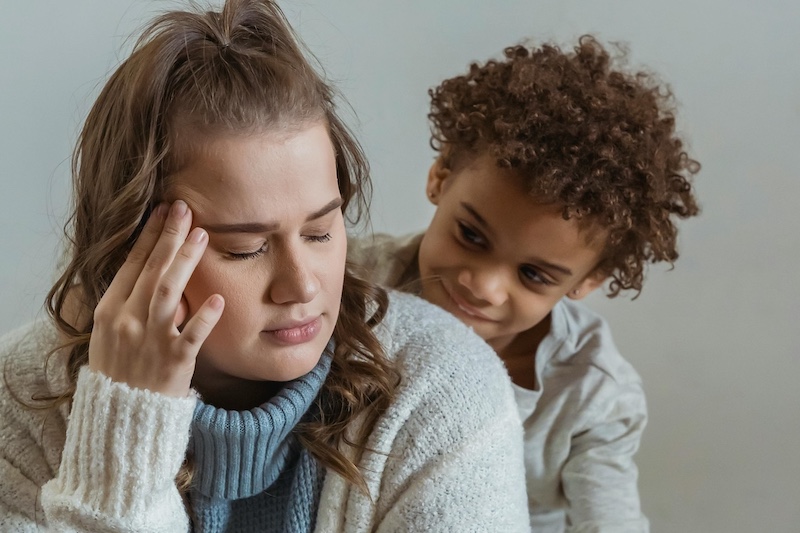I can’t think of a more emotionally demanding job than parenting. Even before we had kids, we were all people with a range of emotions and experiences. We made friends, discovered new places, faced rejection, and sometimes felt overwhelmed with stress. But now, as parents, we’ve added a whole new layer that is directly tied to our kids. We feel emotions on our kids’ behalf, like if we are excited that they learned a new word or sad that they didn’t get invited to a birthday party. And, of course, some of our emotions are elicited by our kids, like if we are proud of their performance at a piano recital or angry at them for whining.
So it makes sense that parenting experts have a lot to say about how and when parents should share their emotions with their kids, both in terms of those baseline emotions that we felt before our kids came into the world (and still do!) and the new emotions we feel because of them. Momfluencers on social media, in particular, seem to have strong and conflicting opinions on the topic, broadly falling into two camps.
One camp says that parents should mostly keep their emotions to themselves. They believe that since our kids depend on us for survival, telling them that we are unhappy is needlessly anxiety-provoking and unfair. And in the same vein, telling them that they make us happy increases their reliance on praise at the expense of intrinsic motivation. These messages, taken to the extremes, can sound pretty scary. They say that parents should refrain from expressing their emotions to their children, since doing so leads to parentification and co-dependency: these children are saddled with the developmentally inappropriate task of holding their parents’ emotions, and thus, they develop an excessive need to please.
The other camp argues that it is essential for parents to express their emotions to their children. Humans are social animals who need to learn to be productive community members. Therefore, children need to develop empathy and recognize that their behaviors and emotions invariably affect the behaviors and emotions of others. As parents, we can only help our kids develop empathy and emotional awareness if we regularly express our own emotions to our kids and show them how their behavior affects how we feel.
So which camp is right?
As a child psychologist and a parent, I know that child-rearing is always more nuanced and complex than Instagram suggests. Still, I was inspired to dig into the research concerning the best ways for parents to convey their emotions to their children. Since parents are, after all, mere mortals who share emotions with their kids, it’s helpful to know what science says about whether, when, and how our own emotional experiences can be harnessed to support our children.

How do parents’ emotions affect child development?
One thing that seems abundantly clear in the literature is that social learning is central to emotional development. In other words, we develop our ability to understand, express, and regulate our emotions by observing and interacting with others. Parents are among the strongest (if not the strongest) models for their children, so the ways that parents express their emotions have a major impact on child development; they affect a variety of child outcomes, including emotion regulation, academic achievement, and conduct problems. These links have been demonstrated across a range of demographics and cultures.
Psychologist Nancy Eisenberg, a leading expert on children’s social-emotional development, wrote that it is “common sense” that parents can express their emotions in ways that support child development. Parental “emotional expressiveness” refers to the manner in which parents convey their emotions to their children. It encompasses the frequency and intensity with which parents display their feelings, as well as the methods they use to express them, such as verbal communication, facial expressions, and body language. Since parents are highly influential models for kids, parents’ emotional expressiveness can be used to help children build their vocabulary, normalize different experiences, and show children that parents understand how they feel.
In fact, parents’ emotional expressiveness is a key component of many emotion coaching programs, which teach parents to help children understand their emotions, why they happen, and how to deal with them. Several of these programs have been subject to experimental scrutiny, and a few have even been studied using the gold standard of experimental design, randomized controlled trials. The evidence supporting emotion coaching is pretty convincing, as it suggests that these interventions can improve children’s self-regulation and adjustment.
Parents’ emotional expressiveness is particularly supportive when the emotions that parents express are positive. The expression of positive emotions — like happiness, gratitude, and pride — is related to a host of positive child outcomes, including self-regulation, social competence, empathy, resilience to stress, reduced risk-taking, and reduced school problems. In general, positive parental affect (i.e., parents appearing happy in front of their children) is good for kids. And, while some people believe that parents’ praise — like saying “good job” to your kid — might decrease intrinsic motivation, there is little if any data to suggest that’s the case, particularly if the child perceives the praise to be sincere.
The data are more mixed when parents express negative emotions: some studies suggest that parental expressiveness of negative emotions is linked to lower social and emotional competence in kids. Untreated mental illness, like depression, can be transmitted from parents to children, and, of course, abuse is always damaging. But some parental negative affect (i.e., appearing unhappy in front of children) can be beneficial if it’s paired with conversations explaining emotions and coping strategies.
In some cases, it can even be beneficial if parents express negative emotions that are elicited by their children (e.g., “You’re making me so angry!”). Several studies examined emotion coaching interventions for parents who became distressed in response to their child’s distress. Parents who learned to express these sorts of negative emotions calmly and deliberately were highly supportive of their children’s emotional development. One specific intervention, called Families Overcoming Under Stress, helped parents and children develop a shared vocabulary to use in talking about their own and each other’s distress. The program suggested saying things like “I feel like I’m in the red zone. Let me take some time by myself to get back to the orange or green zone.” Parents and children who participated in the intervention learned to constructively discuss feelings that arose in relation to stressful family events, and they showed improvements in emotional and behavioral functioning.
How should you express your emotions to your kids?
There is a lot of research to support the notion that parental emotional expressiveness promotes child development. It’s important to talk about your emotions early and often, and you should strive to make conversations about emotions a regular part of the family culture.
When your emotions are positive (i.e., when you are feeling good)
Share these feelings with your children without hesitation. Contrary to some of the messages I saw on Instagram, there is little harm, and perhaps a benefit, in telling kids that what they are doing makes you happy. So go ahead and tell your kid that you are proud of them; you’re not limiting their ability to be proud of themselves.
When your emotions are negative (i.e., when you are upset)
You can also share these types of feelings with your children, but make sure that you are staying regulated and model healthy coping for your children. It’s okay to appear and sound unhappy at times, but show your kids how you take deep breaths to stay calm, and show them constructive ways to problem-solve. In situations involving grief, fear, and sadness, feel free to tell your kids how you feel. If you are scared or sad, they likely are too, so reassure them that they aren’t alone. It’s even fine to cry if you need to — it may be impossible to avoid if you are navigating grief, like the loss of a family member. But even though you’re upset, tell your kids what you are doing to cope.
Sometimes, it’s even helpful to explicitly point out the ways in which the emotions and behaviors of one family member can negatively affect other family members. You can say that something your kid did made you feel angry or sad; just try to do so in a constructive and non-blaming manner. Acknowledge your frustration and name its connection to your kid’s behavior, but keep in mind that excessive yelling, name-calling, and shaming can be damaging to your child and to your relationship with them.
If you notice yourself getting worked up, my best piece of advice is to use a strategy that I like to call disconnect to reconnect. As soon as those feelings arise, take a few moments to separate from your child and try to regulate. Once you feel more in control, go back to your child to talk about what happened in a calmer and more deliberate way. You can feel free to say things like “I was angry when you …” or “I’m so upset that …” and explain the value of taking a break. Separating temporarily from your child is not the same as abandoning them when they are distressed; you are simply taking the time that you need to regroup so that you can support them more effectively. It’s like an oxygen mask on a plane: you can only take care of your kid when you first take care of yourself.
Closing thoughts
The research also points to a desperate need for increased support for parents in the form of affordable child care and mental health services. We are overstretched and drained, which makes it near-impossible to stay calm. These types of support would alleviate some of the stress of parenting, which would be hugely beneficial to both us and our children.
As with all parenting advice, it is easier said than done, but it’s better to trust research than Instagram stories. And the research says that by embracing open communication, regulating emotions, and seeking necessary support, parents can express their emotions to nurture their children’s well-being and growth.
The bottom line
- Parents’ everyday emotional expressiveness plays a central role in shaping children’s emotional skills, behavior, and overall development.
- Talking openly about your emotions (positive and negative) while staying regulated and modeling healthy coping is essential.
- When parents have adequate support, they are far better equipped to nurture their children’s well-being and development.





















Log in
This is so helpful. I’ve been conflicted about this question and yes, confused by the all the parenting strategies recommended on Instagram about not showing emotion.
Thank you for this! I’ve been thinking about + struggling with this topic a lot lately. It seems easy to talk about and model the positive stuff, but I feel much more conflicted about openly expressing when I feel sad, frustrated, or overwhelmed, whether or not the cause of those emotions ties back to my kiddo. Several times my toddler has tried to coach ME through deep breathing if I feel upset, which makes me feel proud of her and her empathy, but also makes me wonder if I’m burdening her with negative emotions in a way that is damaging or unfair. Hope to read more on this complicated topic.